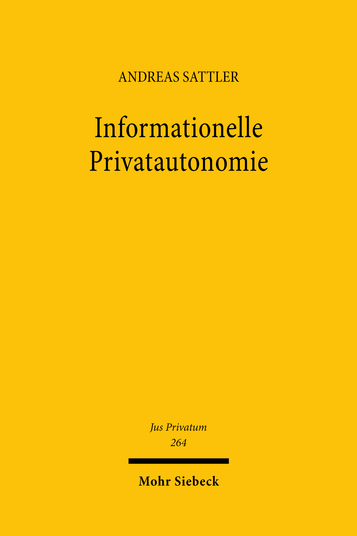Law
Andreas Sattler
Informationelle Privatautonomie
Synchronisierung von Datenschutz- und Vertragsrecht
[Informational Private Autonomy. A Synchronization of Data Protection (Privacy) and Contract Law.]
Also Available As:
Published in German.
The EU digital agenda reveals an unsolved conflict between the protection of personal data/privacy and the guarantee of private autonomy (freedom of contract). Accepting the economic reality that personal data has become an economic commodity, Andreas Sattler proposes a model of empowered informational private autonomy, thus enabling a synchronization of data protection (privacy) and contract law.Survey of contents
Einführung1. Kapitel Grundrechtliche Gewährleistung von informationeller Privatautonomie
A. Dominanz der abwehrrechtlichen Dimension der Grundrechte
B. Asymmetrische Grundrechtssensibilität der DS-GVO
C. Gefährdung der informationellen Privatautonomie
D. Fazit: Privatrechtssensible Auslegung der DS-GVO
2. Kapitel Subsidiarität der Interessenabwägung
A. Die Interessenabwägung als Generalklausel
B. Erleichterung der Datenverarbeitung durch eine Interessenabwägung
C. Herausforderungen einer Datenverarbeitung auf Grundlage der Interessenabwägung
D. Fazit: Funktion als Schrittmacher
3. Kapitel Entlastungsfunktion der vertragsakzessorischen Datenverarbeitung
A. Komplexes Verhältnis zum nationalen Schuldrecht
B. Erleichterungen durch eine vertragsakzessorische Datenverarbeitung
C. Herausforderungen der vertragsakzessorischen Datenverarbeitung
D. Fazit: Entlastungsfunktion von Art. 6 Abs. 1 lit. b DS-GVO
4. Kapitel Die Einwilligung als Nukleus des europäischen Datenschuldrechts
A. Vorrang der Einwilligung
B. Die Einwilligung zwischen Unter- und Übermaßverbot
C. Stufenleiter der Einwilligung
D. Fazit
5. Kapitel Stufenmodell der Erlaubnistatbestände
A. Erste Stufe: Enge Auslegung der Interessenabwägung
B. Zweite Stufe: Enge Auslegung der Vertragsakzessorietät
C. Dritte Stufe: Flexibilisierung des Einwilligungstatbestands
D. Übersicht zum Stufenmodell
6. Kapitel Erforderliche Abstützungen der informationellen Privatautonomie
A. Standardisierte Kennzeichnung und Privacy Score
B. Kontroll-Cockpit für datenschutzrechtliche Erklärungen
Zusammenfassung
